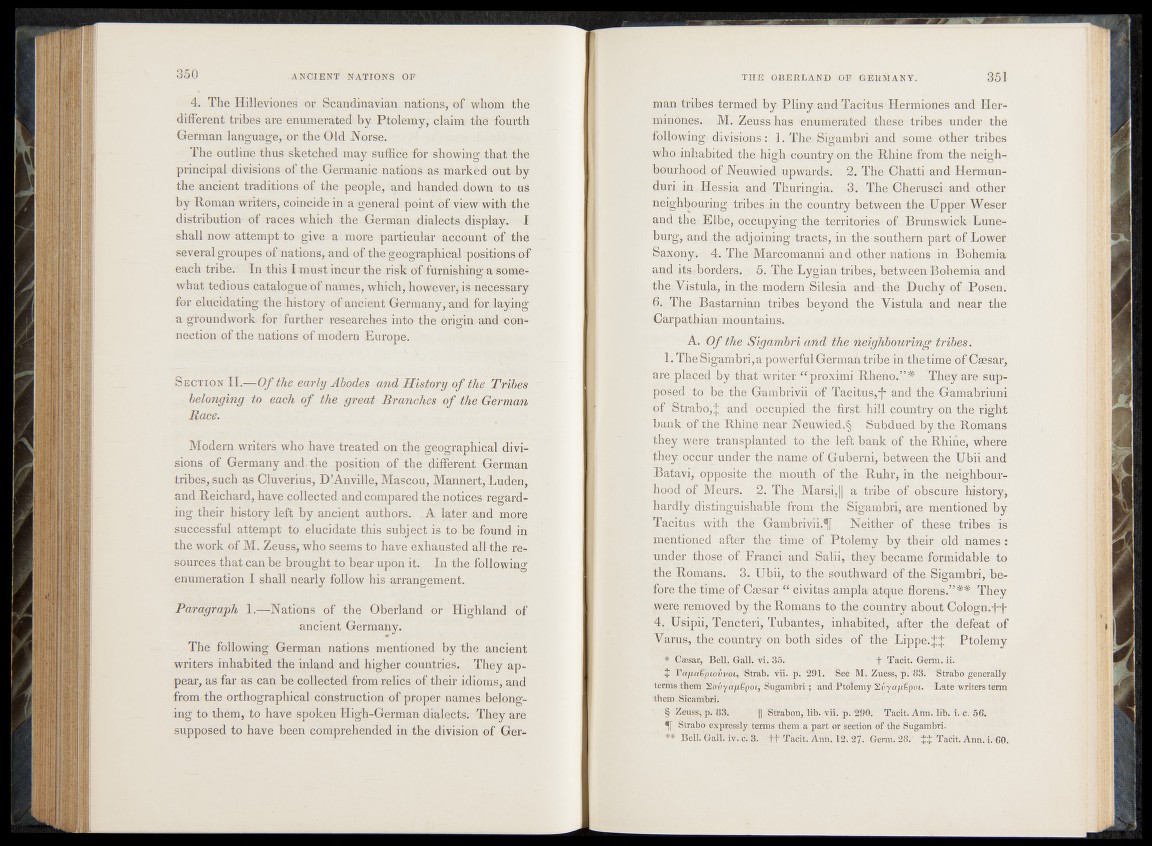
4. The Hiltevioiies or Scandinavian, nations, o f whom the
different tribes are enumerated; by Ptolemy, claim the fourth
German language, mrdlte Old .Nsrse..
The outline thus sketched may suffice for showing.that the
principal divisions of tha*Germaa»e nations as; marked oTit sby
the ancient traditions!©! the people, iand handedffixiwn to ns
by Roman writers,_coirttcide in a general pointfof viewwith the
distribution- of races which theJGerman dialects,display. I
«hall now attempt to give ; a* mote ^particular acubuMttof the
several grouped of'nations, and of. the geographioalpositions of
each tribe. In this Iswiist incur the risfe ©fffilrnisbtog'a some*
what tedious eatatoguenf names, which, ho we wr,! i i necessary
for elucidating the history of ancient Germany, arid fonlaying
a groundworks for- further researches into the origin and cion*
nection of the nations of modern Europe. ’
S ection II.—O f the early Abodes and History o f the Tribes
, belonging to each o f the greait Branches o f the German
Race.
Modern writers^who have treated on the-geographical divisions
,of Germany and,the position of thefoffereiri; Germap
tribes,such as Cluverius, D!Anville, Mascou, Mannert, Euden,
and Reichard, havp collected and compared the potieea regard*
ing their history left by ancient authors. . .A later and more
successful attempt to elucidate dais subject is to be found in
the work of J^. Zeuss^wfiQ seems to have exhausted all the resources
that can be brought ,to bear upon it. In the following
enumeration I shall nearly follow his arrangement.
Paragraph Im ita tio n s of the Oberland or Highland of
ancient Germany.
The following German nations mentioned by the ancient
writers inhabited the inland and higher countries* They appear,
as far as can be collected from relics, of; their idioms, and
from the orthographical construction of-proper names belonging
to. them, to have spoken High-German dialects.-, They are
supposed to have been comprehended in the division of Gertean
tribes termed by Pliny and Tacitus Herrhioues and Her-
manones.. M. enumenafod these tribes 'under the
following; d i v a n s : -1. TheriS^tmbri and some other tribes
who inhabited the high country on the Rhine from the neigh-
bourha©d'..o£ JNieuwied upwards. The Chatti and Hermun-
duri in Hessia and Thuringia, 3 . The Gherusei and other
neighbouring tribes in the country between th e ;Upper Weser
pid the,- Elbeg;. occupying;the foErito,ries‘: ©f .Brunswick, Lune-
burg, andthe, adjoining tracts, in the southern part of^Lower
Saxony* 4*vThe iMarcomanni an d other nation« :in; Bohemia
and ,itsfo©jsders.u5. The LygiurifribeS, between Bohemia.and
Ihif^iiStula, in the modern /Silesia and the Duchy ©f Posemv
The Bastarnian „fribes beyond, the Vistula and near the
Carpathian mountainsi >■>_„
A. O f the Sig'dmbH a n d the neighbouring tribes.
1. THe Sigambri, a!'povfelrful German tribe in the time of Caesar,
are placed by that writer “ proximi Rheno.” * They are shpof
"Tacitus,*!* and the -Gamabritmi
of Strabo, j and occupied, the first hill country on the right
bank oftbe Rhi|irnear Neuwied^' Subdued:,by the Romans
they were transplanted to the left bank of the Rhine, where
i^ey..occur under the name of G uberni^Jjotween the Ubii and
B a t e ^ d p ^ site the mouth^of the .Ruhr, fo the .neighbeur-
of Meurs. ;M2..The Marsi,]] a; tribe of obscure history,
hardly distinguishable from the Sigambri, are mentioned by
Tacitus with the Gambrivii.^T Neither of these tribes is
mentioned after the time o f Ptolemy by their old names *
under those, of Franci and, Sabi, they.; became formidable to
the Romans. 3, Ubii,, to,the southward o f the Sigambri, be-
tfore the time of Caesar “ civitas ampla a|q!ue,florens.,,## They
jyere removed by the Romans to the country about Cologn.+’f;
4, Usipii, Tencteri, Tubantes, inhabited, after , the defeat of
Varus, the country on both sides of the Lippe.J^; Ptolemy
* Caesar, BellA Gall. vi. 35. '1" Tacit. Germ. i© • ’•
$ l'&pci&jiitfovvot, Strab. vii. p. 291. See M. Zuess, *p. 88. Strabo generally
terms them 'SffvyafjitpoL^ Sug&mbri; and Pttifemy EnyaiMpdi. late tmim term
them Sieaafbri.
’ § Zcuss, p. 83. ® §ft rStirabbn, lib.vS. p. ^’9'D, Tacit. Ann. lib. I.c. 56.
* U, Strabo expressly terms them a part or section of the Sugambri.
* * Bell. Gall. iv. c. 3. f f Tacit. Ann. 12. 27. Germ. 28: Tacit. Ann. i. 60.